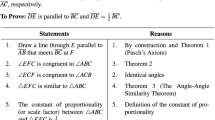Abstract
In this paper, we discuss the prevailing view amongst philosophers and many mathematicians concerning mathematical proof. Following Cellucci, we call the prevailing view the “axiomatic conception” of proof. The conception includes the ideas that: a proof is finite, it proceeds from axioms and it is the final word on the matter of the conclusion. This received view can be traced back to Frege, Hilbert and Gentzen, amongst others, and is prevalent in both mathematical text books and logic text books.
Along with Cellucci, Rav, Grattan-Guinness and Grosholz, we deplore this view of mathematical proof, and favour instead the “analytic conception” of mathematical proof, where the axiomatic proof, when it exists at all, is only the core of a proof. An analytic proof solves a problem, by making hypotheses and using a mixture of deductive moves and induction (loosely construed to include diagrams, etc.) to present a solution to the problem. This implies that proofs are not always finite, that it might involve much more than axioms and straight logical inferences from these deductions and a proof can always be questioned. Moreover, this is where a lot of the interesting conceptual work of mathematics takes place. We view proofs as communicative acts made within the mathematical community which ensures correctness through application, context and standards of rigor.
Similar content being viewed by others
References
Azzouni J.: The derivation-indicator view of mathematical practice’. Philosophia Mathematica 12, 81–105 (2004)
Beall J.C., Restall G.: Logical Pluralism. Oxford University Press, Oxford (2006)
Breger H.: ‘Tacit knowledge and mathematical progress. In: Grosholz, E., Breger, H. (eds) The growth of mathematical knowledge, pp. 221–230. Kluwer, Dordrecht (2000)
Bostock D.: Intermediate Logic. Oxford University Press, Oxford (1997)
Byers W.: How Mathematicians Think. Princeton University Press, Princeton (2007)
Cantor, G., Contributions to the Founding of the Theory of Transfinite Numbers. Translated by Jourdan, 1915, New York, Dover, 1952.
Cellucci C.: ‘Why Proof? What is Proof?’. In: Corsi, G., Lupacchini, R. (eds) Deduction, Computation, Experiment. Exploring the effectiveness of Proof, pp. 1–27. Springer-Verlag, Berlin (2008)
Cellucci C.: ‘The growth of mathematical knowledge: an open world view’. In: Grosholz, E., Breger, H. (eds) The growth of mathematical knowledge, pp. 153–176. Kluwer, Dordrecht (2000)
Floyd, J., ‘Das ¨Uberraschende: Wittgenstein on the Surprising in Mathematics’, in J. Ellis and D. Guevara (eds.), Wittgenstein and the Philosophy of Mind, Oxford University Press, Oxford, (forth).
Gentzen G.: ‘Investigations into logical deduction’. In: Szabo, M.E. (eds) The collected papers of Gerhard Gentzen, pp. 68–131. North-Holland, Amsterdam (1969)
Giaquinto M.: The search for certainty: a philosophical account of the foundations of mathematics. Clarendon Press, Oxford (2002)
Grattan-Guinness, I., ‘Solving Wigner’s mystery: the reasonable effectiveness of mathematics in the natural sciences’, Mathematical Intelligencer 30 (2008), pp. 7–17.
Grosholz E.: Representation and productive ambiguity in mathematics and the sciences. Oxford University Press, Oxford (2007)
Hilbert, D., ‘The foundations of mathematics’, in J. van Heijenoort (ed.), From Frege to Gödel. A source book in mathematical logic, 1879-1931, Harvard University Press, Cambridge MA, 1967, pp. 464–479.
Lucas J.R.: The conceptual roots of mathematics. Routledge, London and New York (2000)
Putnam, H., ‘Models and Reality’, Journal of Symbolic Logic 45.3 (September 1980), 464–482. Reprinted in Philosophy of Mathematics: Selected Readings, 2nd ed. (1983), pp. 421–445.
Rav Y.: ‘A Critique of a Formalist-Mechanist Version of the Justification of Arguments in Mathematicians’ Proof Practices’. Philosophia Mathematica (III) 15, 291–320 (2007)
Rota, G.-C., ‘The Phenomenology of Mathematical Proof’, Synthese III (1997), 183–196.
Schlimm, D., ‘Bridging theories with axioms: Boole, Stone, and Tarski’, in B. van Kerkhove (ed.), New Perspectives on Mathematical Practices, World Scientific, 2009, pp. 222–235.
Tennant, N., Natural Logicism, Paper presented at the 10th Midwest PhilMath Workshop, Department of Philosophy, Notre Dame University, U.S.A. October 2009.
Tennant N.: Natural Logic. Edinburgh University Press, Edinburgh (1978)
Thurston W.P.: ‘On Proof and Progress in Mathematics’. Bulletin of the American Mathematical Society 30(2), 161–177 (1994)
Author information
Authors and Affiliations
Corresponding author
Rights and permissions
About this article
Cite this article
Goethe, N.B., Friend, M. Confronting Ideals of Proof with the Ways of Proving of the Research Mathematician. Stud Logica 96, 273–288 (2010). https://doi.org/10.1007/s11225-010-9284-0
Published:
Issue Date:
DOI: https://doi.org/10.1007/s11225-010-9284-0




